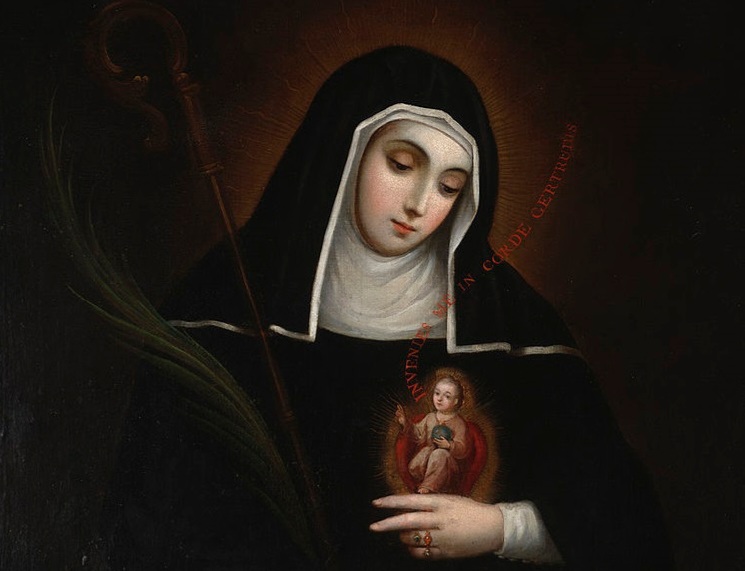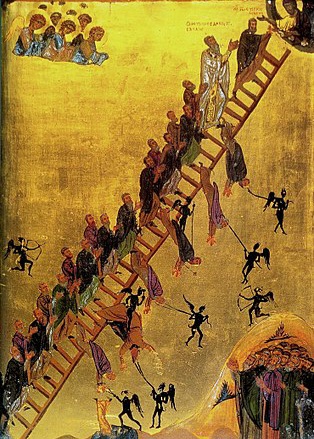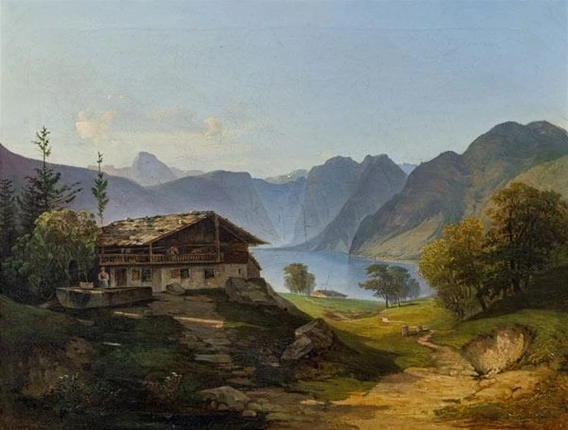How brightly the gift of trust (I call it a gift rather than a virtue) shone in her can be demonstrated by excellent evidence. Her soul was always in such a state of serene confidence that neither tribulations, nor loss, nor hindrances of any kind (cf. Rom. 8:35–39), nor even her own faults, could cloud or shake this firm confidence in the infinite loving mercy of God. If it happened that God deprived her of the consolation to which she was accustomed, she was undismayed, because to enjoy grace or to be deprived of the enjoyment of grace was all the same to her; except that sometimes, in times of trial, this hope even increased her strength, for she was convinced that everything, exterior or interior, would work together for good (Rom. 8:28). As one waits hopefully for the messenger who brings long-desired news, so she awaited gladly a richer flood of divine consolation, for which she knew she had been made more apt by the preceding adversity. The sight of her own faults could not depress or discourage her for long, because at once she was borne up again and sustained by divine grace, ready to receive whatever gifts God was to restore to her. If she saw herself as dark as a dead cinder, she strove to raise herself to the Lord, by at once cooperating with God’s grace. So she began to breathe again and was ready to receive the likeness of God in herself once more. Like a man who steps from the shadows into the sunlight and finds himself suddenly inundated with light, she felt herself to be illuminated by the splendor of the divine presence and to be adorned with every ornament, clothed in the embroidered golden robe, as befits the queen who is to appear before the eternal, immortal King (Ps 44:9, 14-15; 1 Tim 1:17), made ready and chosen for divine union and companionship –St Gertrude chapter 1 “The Herald of Divine Love”
Archives

A Savior amidst gifts wasted
What the malice and wickedness of my own perversity have done to corrupt this devotion can be made good by the fullness of the power of the love which dwells (Col 1:19) in Him who sits on Your right hand (Col 3:1), who has become bone of my bone and flesh of my flesh (Gen 2:23). Now it is through Him that You have granted us, in the Holy Spirit, the capacity for noble sentiments of compassion, humility, and reverence. And through Him I offer you my laments for the very many infidelities and sins which I have committed in thought, word, and deed, offending against the divine nobility of your goodness, but especially for being so unfaithful, careless, and irreverent in the use of your gifts. If you had given me, in my unworthiness, no more than a thread of flax as a memento, I should have respected it and treated it more reverently. –St Gertrude “The Herald of Divine Love”


A Vocation
Be quiet, my soul, you’re talking too much!
It was good to be up there, with Peter and John, contemplating the Bridegroom’s glory, staying with him for a long time, and –if he would have wanted– putting up not two or three tents but only one in which to dwell together in his joy! Yet, the Bridegroom is already exclaiming: Let me leave, dawn is already coming. You have received the luminous grace and the so strongly desired visit. Then he blesses you and, as the angel once did to Jacob, mortifies the nerve of your thigh (Gen 32:25.31); he changes your name from Jacob to Israel and thereafter seems to leave. The Bridegroom, desired for so long, quickly hides himself; the vision of the contemplation fades and its sweetness evaporates. Yet the Bridegroom remains present in your heart, constantly governing it. —Guigo II the Carthusian “The Ladder of Monks”


Sacrifice
The LORD was pleased
to crush him in infirmity.
If he gives his life as an offering for sin,
he shall see his descendants in a long life,
and the will of the LORD shall be accomplished through him.
Because of his affliction
he shall see the light in fullness of days;
through his suffering, my servant shall justify many,
and their guilt he shall bear.
Isaiah

Gradual ascent
His contempt for relations, his disgust for acquaintances grew on him. “No to everything …rather than mix myself again with society,” he declared to himself, and then he was silent in despair, for he was not ignorant that he could not, apart from the monastic zone, live in isolation. After a short time would come weariness and a void, therefore why had he reserved nothing for himself, why had he trusted all to the cloister? He had not even known how to arrange the pleasure of entering into himself, he had discovered how to lose the amusement of bric-à-brac, how to extirpate that last satisfaction in the white nakedness of a cell! He no longer held to anything, but lay dismantled, saying, “I have renounced almost all the happiness which might fall to me, and what am I going to put in its place?”
And terrified, he perceived the disquiet of a conscience ready to torment itself, the permanent reproaches of an acquired lukewarmness, the apprehensions of doubts against Faith, fear of furious clamours of the senses…
J.K. Huysmans

The Lord speaks
But it displeased Jonah exceedingly, and he was angry. And he prayed to the LORD and said, “I pray thee, LORD, is not this what I said when I was yet in my country? That is why I made haste to flee to Tarshish; for I knew that thou art a gracious God and merciful, slow to anger, and abounding in steadfast love Therefore now, O LORD, take my life from me, I beseech thee, for it is better for me to die than to live.” And the LORD said, “Do you do well to be angry?” Then Jonah went out of the city and sat to the east of the city, and made a booth for himself there. He sat under it in the shade, till he should see what would become of the city. And the LORD God appointed a plant, and made it come up over Jonah, that it might be a shade over his head, to save him from his discomfort. So Jonah was exceedingly glad because of the plant. But when dawn came up the next day, God appointed a worm which attacked the plant, so that it withered. When the sun rose, God appointed a sultry east wind, and the sun beat upon the head of Jonah so that he was faint; and he asked that he might die, and said, “It is better for me to die than to live.” But God said to Jonah, “Do you do well to be angry for the plant?” And he said, “I do well to be angry, angry enough to die.” And the LORD said, “You pity the plant, for which you did not labor, nor did you make it grow, which came into being in a night, and perished in a night. And should not I pity Nin’eveh, that great city, in which there are more than a hundred and twenty thousand persons who do not know their right hand from their left, and also much cattle?” –Jonah

Fellowship story
Then everyone prepared to start.
The alpine hut was not far from Gschaid and in summer one could see it plainly from the village with its little bell-tower on the green of the upland pasture; but just below was a precipitous drop of many fathoms; it could be descended in summer but only with spiked shoes, and in winter not at all. One had to take a roundabout way to the col and thence down to Gschaid from the memorial post. By that way, one crossed the alpine meadow which is still nearer Gschaid and could, from there, almost imagine one saw the windows of the village.
Because of the commotion in Gschaid that morning, the priest had postponed High Mass, supposing the children would soon be found. But still no word came, so the rites must be observed, and when those crossing the Sider meadow heard the little bell that signified the Elevation of the Host, all sank on their knees in the snow and prayed. Then, when the sound of the bell died away, they rose and went on.
The shoemaker carried little Sanna most of the way, she telling him everything.
When they had almost reached the col-forest they came upon footprints and the shoemaker said, “No work of mine made those marks.”
It was soon explained. Attracted, no doubt, by the echoing of the many voices, another searching party was coming to join the one descending. It was headed by the dyer, chalk-white with fear, who had come down the mountain with his workmen, apprentices, and others from Millsdorf.
“They’ve been over the glacier and the crevasses without knowing it,” the shoemaker called out to his father-in-law.
Well here they are—here they God,” answered the dyer. “I knew they must be up there when your messenger came in the night and we set out with lanterns and searched the whole woodland without finding anything; then as the gray of dawn broke, I noticed on the way from the memorial post, the child said: “Mother, last night when we were up there on the mountain, I saw the Holy Christ-child. “
“O my brave long-suffering, my precious, my beloved child,” answered her mother, “He has also sent you some presents and you are to have them now.”
The cardboard boxes had been unpacked and the candles lit, the door into the big room was opened, and from their beds the children saw the belated, brightly shining, welcoming Christmas tree. Despite their fatigue they wanted to put on some clothes so that they could go into the other room; and there they received their presents, admired them, and then fell asleep over them.
Gschaid Inn that evening was livelier than usual. All who had not been in church were there; the others also. Each related what he had seen and heard, what he had done, what advised, what he had experienced and all the risks he had run. And especially was it emphasized how everything could have been done differently and better.
A Christmas epoch-making in the history of Gschaid, the subject of conversation for a long time, it will be talked of for years to come, especially on clear days when the mountain is unusually distinct or when someone is describing its characteristics to strangers.
Only from that day on were the children really felt to belong to the village, and not to be outsiders. Thenceforth they were regarded as natives whom the people had brought back to themselves from the mountain.
Their mother Sanna was now a native of Gschaid too.
The children, however, can never forget the mountain, and earnestly fix their gaze upon it when in the garden, when as in times past the sun is out bright and warm, the linden diffuses its fragrance, the bees are humming, and the mountain looks down upon them as serene and blue as the sky above. –Adalbert Stifter ‘Rock Crystal’

Painting by Adalbert Stifter


Recent Comments